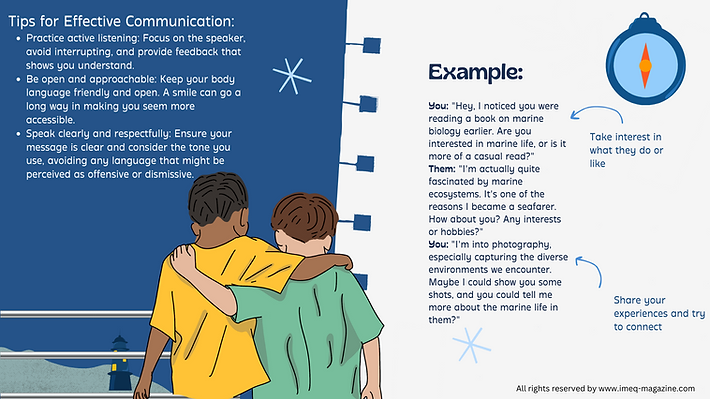
1. Establishing Good Communication
Good communication is the cornerstone of any relationship, and it's especially important in the confined and often stressful environment onboard. Active listening plays a key role; it involves paying full attention to the speaker, understanding their message, responding thoughtfully, and remembering the conversation. This demonstrates respect and interest in your crewmates, laying a foundation for mutual trust and understanding.
Tips for Effective Communication:
- Practice active listening: Focus on the speaker, avoid interrupting, and provide feedback that shows you understand.
- Be open and approachable: Keep your body language friendly and open. A smile can go a long way in making you seem more accessible.
- Speak clearly and respectfully: Ensure your message is clear and consider the tone you use, avoiding any language that might be perceived as offensive or dismissive.
2. Conversation Ideas and Tips
Conversations are the bridges that connect us, revealing common interests and forging friendships. However, finding topics of interest in a diverse crew can be challenging.
Engaging Conversation Starters:
- Share experiences from previous voyages: This can include interesting destinations, challenges overcome, or funny anecdotes.
- Ask about hobbies or interests: Many seafarers have unique hobbies; expressing genuine interest can lead to fascinating conversations.
- Discuss future aspirations: Goals and dreams are personal yet universal topics that can deepen connections.
Strategies for Maintaining Positive Conversations:
- Keep it positive: Focus on uplifting and engaging topics to foster a pleasant atmosphere.
- Be inclusive: Make an effort to include everyone in the conversation, especially those who might be shy or reserved.
- Avoid sensitive topics: Steering clear of politics, religion, or personal controversies can prevent conflicts.
3. Dealing with Difficult Relationships
Despite our best efforts, conflicts and clashes are inevitable. The key is to handle these situations with grace and professionalism.
Strategies for Handling Disagreements or Aggression:
- Stay calm and respectful: Responding with anger or defensiveness can escalate the situation. Taking a moment to breathe and calm down can help you approach the problem more constructively.
- Seek to understand: Often, aggressive behavior stems from misunderstanding or personal issues. Try to understand the other person's perspective, even if you disagree.
- Establish boundaries: It's important to communicate your boundaries clearly and respectfully if someone's behavior is unacceptable.
- Seek mediation: If the situation doesn't improve, involving a superior or a mediator can help resolve conflicts more formally and effectively.
Friendship at sea is about more than just passing the time; it's about building a supportive community that can enhance the overall well-being and morale of the crew. By prioritizing good communication, engaging in meaningful conversations, and handling conflicts with empathy and professionalism, seafarers can create lasting friendships that make life at sea both enjoyable and rewarding.
Remember, the journey of friendship is a voyage in itself, one that requires patience, openness, and effort from all involved.
Safe travels and happy bonding on the high seas.
Examples of Engaging in Conversations
Example 1: Sharing Experiences
- You: "Hey, ever see something amazing out at sea? I was just looking out and remembered this crazy sunset once."
- Them: "Yeah, totally. There was this one night near the equator where the stars were just unreal."
- You: "Sounds awesome. What's your favourite thing about being out here?"
Example 2: Discussing Hobbies
- You: "Saw you with that marine biology book. You into that stuff, or just killing time?"
- Them: "I'm really into it, actually. Always been fascinated by the ocean. What about you? Got any hobbies?"
- You: "I like taking photos, especially of the places we go. Maybe I can show you some, and you can tell me more about what's in them?"
Example 3: Future Aspirations
- You: "Lately, I've been thinking about what's next, like skills I wanna learn or places I wanna see. How about you? Got any big plans for your time at sea?"
- Them: "Yeah, I wanna work my way up to first officer. I like the challenge. What's on your list?"
- You: "I'm trying to get better at navigating. And I've got this list of places I wanna visit. Maybe we can swap some tips."
Example 4: Common Interests
- You: "Did you catch the football game last night? It was pretty good."
- Them: "Nah, missed it. I had watch. Who won?"
- You: "Barcelona did. It was close though. You into football? We could watch the next one together."
- Them: "Sounds good. I'm a big fan but never have anyone to watch with."
Example 5: Learning and Sharing Knowledge
- You: "I'm trying to get the hang of celestial navigation. It's cool but kinda tough. You know anything about it?"
- Them: "A little. Took a course a few years back. It's not easy at first."
- You: "Mind giving me some pointers sometime? I could really use the help."
- Them:"Sure, no problem. Let's find a time this week to sit down with it."
Keeping conversations casual and straightforward can help make the connection more natural and comfortable for everyone involved.
If you are looking for coaching sessions on creating connections onboard contact:
icrc@imeq-center.com
www.imeq-center.com




